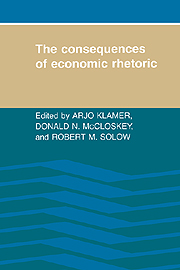Book contents
- Frontmatter
- Contents
- Preface
- The consequences of economic rhetoric
- PART I ECONOMIC RHETORIC: INTRODUCTION AND COMMENTS
- 1 Economics in the human conversation
- 2 Comments from outside economics
- 3 Comments from inside economics
- 4 Rhetoric and ideology
- PART II ECONOMIC RHETORIC: FURTHER ARGUMENTS
- PART III ECONOMIC RHETORIC AMONG ECONOMISTS
- PART IV ECONOMIC RHETORIC IN POLITICS AND JOURNALISM
- PART V ECONOMIC RHETORIC: ITS RHETORIC AND ITS CONSEQUENCES
- 1 Appendix: Other contributors and participants
- Index
2 - Comments from outside economics
Published online by Cambridge University Press: 07 September 2010
- Frontmatter
- Contents
- Preface
- The consequences of economic rhetoric
- PART I ECONOMIC RHETORIC: INTRODUCTION AND COMMENTS
- 1 Economics in the human conversation
- 2 Comments from outside economics
- 3 Comments from inside economics
- 4 Rhetoric and ideology
- PART II ECONOMIC RHETORIC: FURTHER ARGUMENTS
- PART III ECONOMIC RHETORIC AMONG ECONOMISTS
- PART IV ECONOMIC RHETORIC IN POLITICS AND JOURNALISM
- PART V ECONOMIC RHETORIC: ITS RHETORIC AND ITS CONSEQUENCES
- 1 Appendix: Other contributors and participants
- Index
Summary
In terms of the larger institution of the academy, as opposed to the smaller institution of any one of our disciplines, something remarkable has happened in the past twenty-five years. For one thing, I am now a professor of law, and that is itself a remarkable fact since, if the truth were told, my qualifications are much smaller than I'd like them to be. Moreover, if twenty-five years ago you had asked a bunch of law professors which of the other disciplines was most likely to provide help for their work and their thinking, I dare say that literary criticism would have been extremely low on the list. In fact, if you had put that question to almost any other discipline but literary criticism, literary criticism would have been extremely low on anyone's list. It is now very high. Now this is a marketplace consideration, a political and sociological phenomenon from which I draw certain kinds of sustenance: moral, professional, and monetary. So I don't want to exactly sneer at it, but I do want to comment on it for a moment.
Because of the influence of the work of some of the people whose names have been bandied about here, because of the impact of essays like Clifford Geertz's “Blurred Genres” in The American Scholar (1980), there's been a tendency for disciplines to begin to think of themselves as components in a cultural inquiry rather than as isolated units. For reasons that would take too long to explore, this has had the effect of a great many disciplines suddenly finding in literary theory and in literary study (of all places) ways of talking and ways of thinking.
- Type
- Chapter
- Information
- The Consequences of Economic Rhetoric , pp. 21 - 30Publisher: Cambridge University PressPrint publication year: 1989



